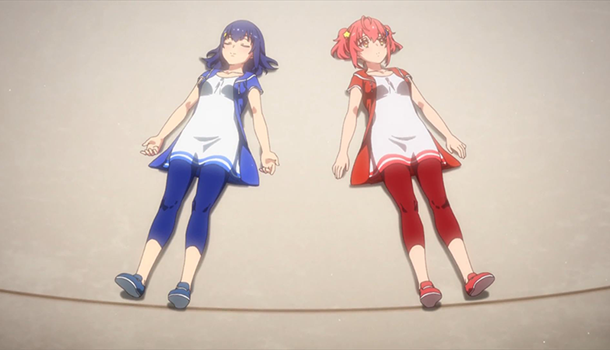
Written by Jack Andow on 11 Aug 2023
Distributor Crunchyroll • Certificate NA • Price NA
I’m normally pretty on top of knowing which anime shows are coming out each season, but to my surprise a few episodes into last season, spring 2023, I spotted a show that I must’ve completely missed while looking at the seasonal charts - World Dai Star. Although maybe it's not too surprising, as even now at the same point in the summer season the show only has around 11000 members on MAL, making it one of the least watched of last season. While I know nothing about theatre in real life, I’ve had quite a good time watching both Kageki Shoujo!!, and one of my favourite anime of all time, Shoujo☆Kageki Revue Starlight in the past, so seeing this was looking to be a similar show I thought I’d give it a go. After watching what was out at the time I was quite enjoying it despite its at-the-time below average score on MAL. By the end of the show I was thinking that it was probably my favourite of the season, standing up to other great shows like Oshi no Ko and Boku no Kokoro no Yabai Yatsu. This when, despite a decent rating jump, World Dai Star is still rated far below them, only just being rated in the top half of the season. I wouldn’t necessarily say it’s an underrated gem as it definitely does have some problems, but I think it’s a show that’s worth a watch if you like this kind of thing.
In the alternate reality of World Dai Star, theatre has become the premier form of entertainment across the globe. Renowned actors who are able to outshine other actors through special abilities known as senses receive the title of Dai Star, and among them the best of the best actors are called World Dai Stars. The show follows aspiring actress Kokona Ootori who one day dreams of becoming a World Dai Star. After failing a number of auditions she tries out for the famous musical theatre troupe Sirius, and it's here where her dream to become a World Dai Star begins.
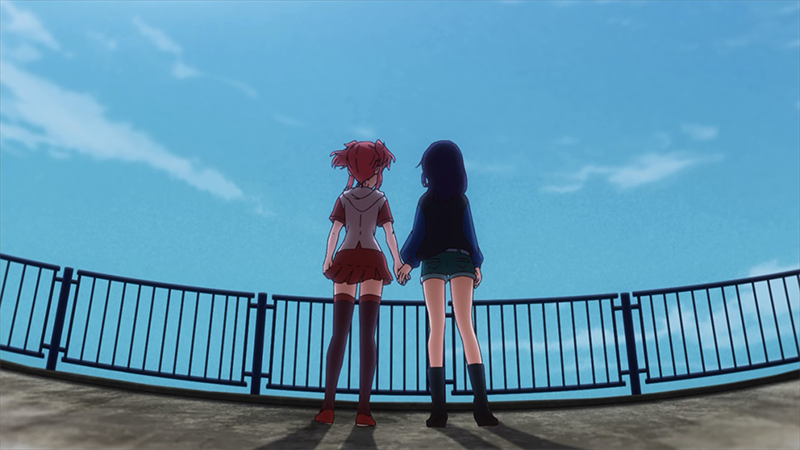
I think the immediate hook for World Dai Star, outside of the acting premise, is the existence of senses which leads to a pretty interesting first episode of the show (that I unfortunately cannot spoil). They are supernatural abilities talented actors possess that are able to make them stand out by allowing them to bring out the most in their acting. Some examples include being able to read the mind of the audience or being able to create stage scenery and costumes out of thin air. This adds an extra layer of interest to the acting element of the anime, allowing it to do a couple of things they wouldn’t be able to do otherwise, such as the aforementioned creating things out of thin air. As cool as senses are though, they are also probably the main problem with the show because nothing about them is ever explained. Abilities not being explained is just generally frustrating as it allows the writers to do whatever they want and handwave it because the audience doesn’t know any better. While World Dai Star isn’t too egregious with doing this, it’s definitely still present, in particular with Kokona’s sense. The lack of explanation isn’t only a negative though, as it helps add a sense of mystery - I read a lot of theories on where the plot was going to go when it was airing. This is particularly relevant for Kokona, whose sense is pivotal to her character arc.
Kokona’s sense is the most interesting in the show, what it is exactly I couldn’t tell you because it’s never explained, but it leads to the manifestation of another character entirely, Shizuka. Kokona sees Shizuka as her ideal actor and because of this she plays her roles in the same way that Shizuka would. Throughout World Dai Star we see Kokona develop her acting ability and also how her mindset towards acting changes leading to her feeling more confident in her ability to play her roles. This combined with how her arc is tied to the existence of Shizuka, what she means to Kokona and her dream to become a World Dai Star, leads to a compelling character arc with a strong climax. One thing I thought was pretty neat in the show is the choice to perform The Phantom of the Opera given how there are parallels with this musical and the relationship between Kokona and Shizuka. There are problems with Kokona’s arc however, such as the lack of explanation as to what Shizuka really is, or how Kokona’s sense works and this does make it feel a little muddy. With Shizuka inherently tied to Kokana, it feels like she doesn’t get much personal development throughout the show in any way that is unrelated to Kokona.
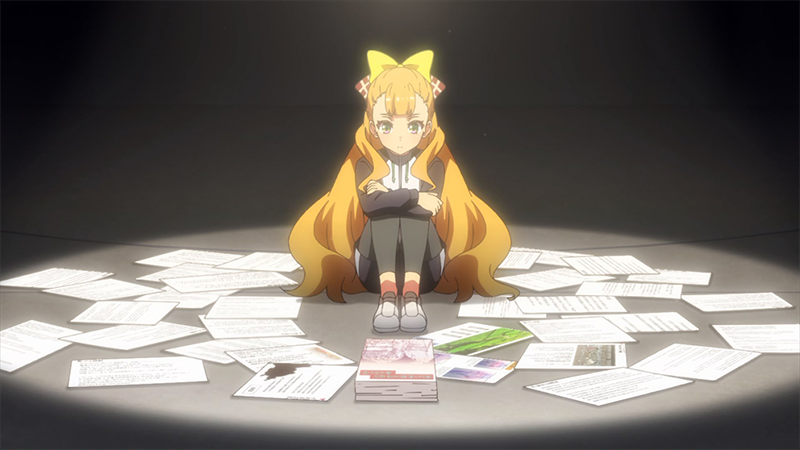
Outside of Kokona, the character that gets the most development throughout the show is Kathrina Griebel, a talented up and coming actor from Germany who’s the daughter of two World Dai Stars. She originally starts out as someone who’s pretty arrogant because of her acting ability, getting angry at Kokona whenever she makes mistakes and generally being unwilling to talk to her, putting up a line of boxes to divide their shared room so they can’t even see each other which also works as a pretty neat visual metaphor. Because of this she feels like a rather shallow character at the start of World Dai Star, but she does get some great character development later on, starting as someone who seems relatively one dimensional to a character that is nuanced after having to overcome multiple problems throughout the course of the show.
Kathrina’s acting isn’t quite as perfect as it seems due to her having a massive flaw caused by her sense. Though she seems confident on the surface, even after being able to overcome said flaw she feels that she has been a disappointment at Sirius and has doubts about the quality of her acting compared to Kokona. Appearing near the end of the show, Kathrina’s mother, Theresa, is an important part of her arc, despite how Kathrina thinks she will react, Theresa is only supportive of her daughter, helping Kathrina with overcoming her problems which I think is a good showcase of their relationship. Another strongpoint of Kathrina’s character is how slowly over time she moves away from her initial antagonistic personality, learning to open up and communicate with others and becoming good friends with the rest of the troupe. Unfortunately though, similarly to Kokona, Kathrina’s sense is poorly defined. Her sense allows her to stop time, but at the same time she is able to massively increase her level of concentration. Those two things don’t seem to have any connection and you never learn if they’re part of the same ability or two different ones.
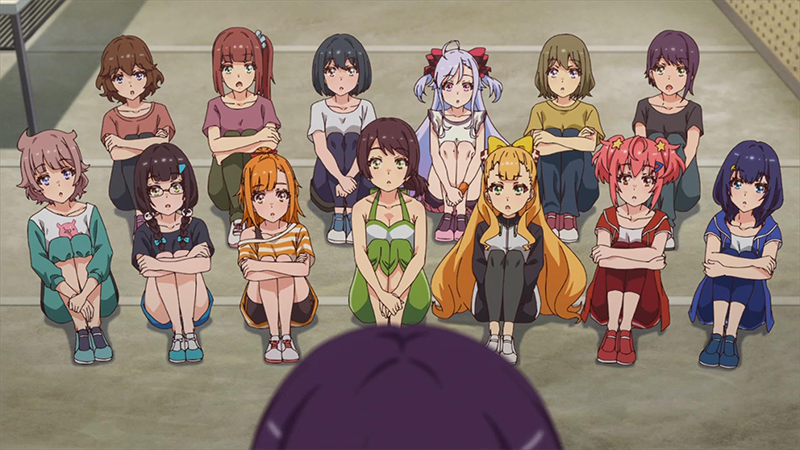
Another character that plays a big role in World Dai Star is Yae Niizuma, the best actor in Sirius, an 11 year old prodigy on the verge of becoming a Dai Star. A cheerful and caring character who feels the polar opposite of how Kathrina is at the start of the show. For example even when Kokona gets given the lead role in a play despite obviously not being as good as Yae, she doesn’t complain at all. But behind this cheery attitude she is determined to become a Dai Star so that she can bring the vice president of Sirius out of retirement. Compared to Kokona and Kathrina though, the show doesn’t really go too in depth with this plotline leading to Yae not quite being on the same level as them.
The last two main actors in Sirius are childhood friends Panda Yanagiba and Chisa Sasuga. While they do get an episode dedicated to them where you find out about their backstory, they don’t really have what I’d call a character arc per-se and as such feel a little underdeveloped. That being said they are a great addition to the cast with how they add to the overall chemistry. The last two members of Sirius worth mentioning are the aforementioned vice president, Noa Hiiragi, and the president, Shamo Yamabuki, both famous actresses in the past. These two act as mentors for the cast; Noa makes the main decisions in the troupe and is invaluable for giving out acting advice, and Shamo provides wise words to the characters in their times of need. As mentioned, Noa is an important part behind Yae’s drive in wanting to be the best she can. There is also some of the other side of that showing that Noa does still have some drive to act again despite retiring, unfortunately similar to Yae’s half, her character is also underexplored in the anime.
A lot of the drama in World Dai Star is related to acting itself and this is where I think it shines. The characters are constantly having to fight for roles, showing off their own personal reading of how they think the characters in the play would feel and act if they were a real person, all the while dealing with their personal hang ups that I’ve already mentioned. The show is able to weave this personal drama with the performances very well, leading to the plays having a lot of impact both from the performance itself and the underlying story, making them incredibly entertaining to watch. World Dai Star also has a lot of slice of life/comedic parts which both allows us to get to know the cast’s personalities in more epth and gives us some much needed time to breathe between the more dramatic sections. I would say these parts are definitely a step down compared to the dramatic moments though.
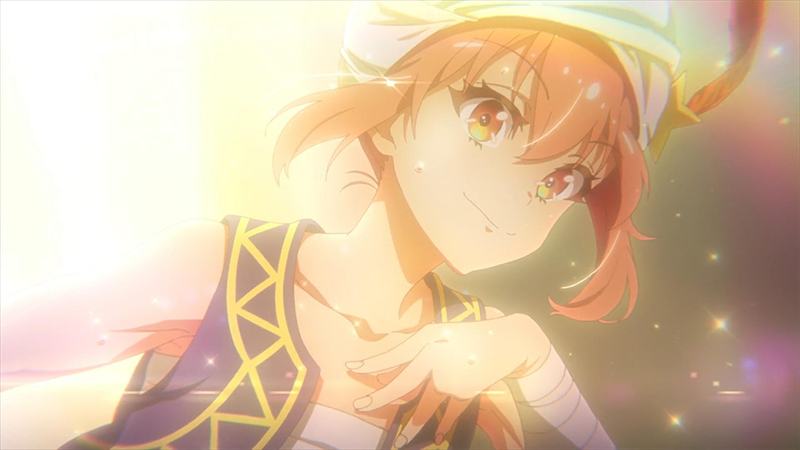
What is a play without the acting? The performances during World Dai Star stand out due to how well it is able to showcase this both from a visual and audio perspective. During these scenes the show features incredible character animation. I’m no animation expert so I can’t say why, but the animation is significantly more fluid during the plays than otherwise outside of these performances. This allows for the characters to have incredibly expressive movements (if you look at Yae), greatly benefiting their ability to project the emotions of their roles through their body language. This effect is all the more amplified by the common usage of a slight camera shake during these scenes, giving an extra sense of movement to them. In stark contrast to these exaggerated movements, the animation is also able to showcase subtle gestures at an impressive level (if you look at Kokona in the gif linked previously). Often everyone on stage is constantly animated, allowing for the characters to show subtle reactions to the lines being delivered in real time. This is a big departure from anime normally, as usually only the character speaking is animated and there will only be a reaction after the line is delivered. This helps add both an extra sense of realism to these scenes and is another tool the character’s have to portray the personality of their role.
While not quite as impressive, the cinematography is another strong part of the show’s production. The stage lighting is effectively used to highlight the emotions in play during a scene. For example, spotlights are used to highlight specific characters, and coloured lighting is used to represent certain emotions. This goes past the surface level of being used just as part of the play by also showing off the emotions that the actors have during the performances. The lighting also works wonders in creating striking shots that leave a strong impact. Other elements such as framing, layouts, and camera movement are used similarly to the lighting, making the plays scenes engaging while often having some extra meaning behind them. One example being the aforementioned camera shake technique which adds to the scenes even outside of how it helps convey the animation. In particular, it is used to great effect during the first episode showcasing the sense of unease that the Sea Witch is meant to give off but also the unease that the people auditioning feel about having to perform. This is then in stark contrast to later, when it is no longer used during Kathrina’s lines during her audition as she feels no unease unlike the earlier participants.
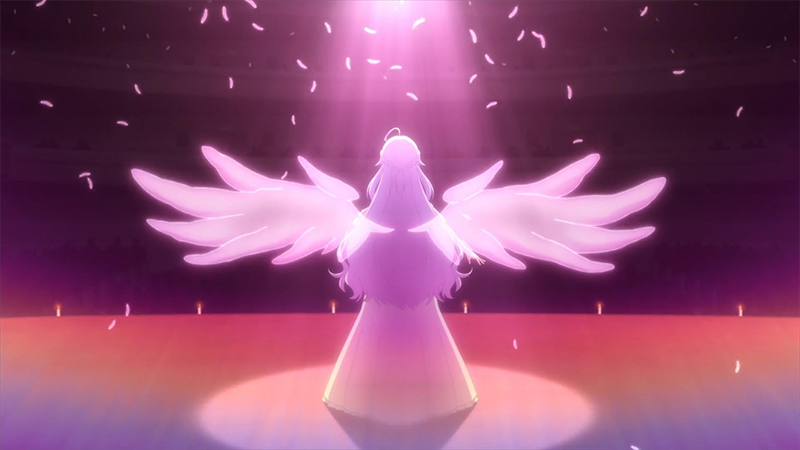
The voice acting might be the most important element that makes the acting portion of World Dai Star so successful, featuring a number of incredible vocal performances (unfortunately youtube doesn't have a good example video for this). Comparing the different ways the voice actors are able to portray their characters’ roles allows you to really feel the emotions that the characters are trying to portray. Each performer's reading of the role differs and showcases how they personally are trying to bring the character behind the role to life. This is quite enthralling to viewers, just as it is to the in-world audience at the shows. This applies both to different characters doing the same role and the same character doing different roles in the show. The voice acting in World Dai Star is also able to emphasise the growth of the characters throughout. This is most noticeable for Kokona, whose VA, Manaka Iwami, is impressively able to convey two different readings of the same role by Kokona across two episodes. By extension showing the difference in Kokona herself between these two performances - it's a tremendous showcase of the talented voice actors used in the anime, and must have been a real challenge for the actors.
As World Dai Star is based on musical theatre, musical pieces are inevitable during the plays. They are all great, fitting the scenes well and giving another avenue for the characters to project their role. I wouldn’t really listen to the majority of them outside of their appearance in the show though. A lot of them are sung by Yae, and her VA, Maria Naganawa, does a wonderful job with the vocals which is quite fitting given Yae’s sense, which is the ability to project her feelings to the audience through song. The OST is also solid, using varying instrumentation to fit each of the plays that helps set the overall mood for them. The most prominent examples being Japanese for The Tale of the Bamboo Cutter and Middle Eastern for Arabian Nights.
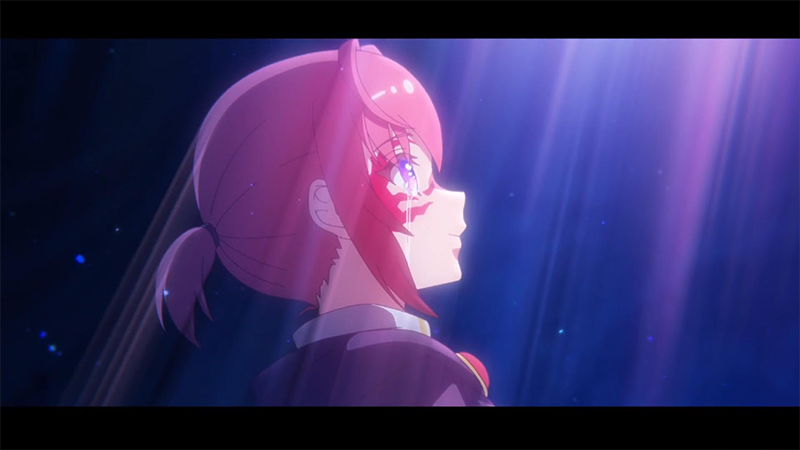
I’d like to make specific mention of the performance of The Phantom of the Opera, the highlight episode of World Dai Star due to it having the best use of these production elements. This being all the more impressive as it’s the longest performance in it. The final part of the play utilises a cinematic aspect ratio making you feel that the play is real and not just a performance and similarly the set design changes make it much more realistic. This final touch makes this part of the play possibly my favourite anime scene of the entire year so far.
Outside of the performances the production elements of World Dai Star are unfortunately not quite as good. As mentioned already, the animation is completely different during these scenes so while it’s still good, it’s nothing special. The character designs are pretty standard for a gacha show, appealing to look at with bright colours but nothing special. The cinematography is pretty standard with the slice of life scenes often just having shot-reverse shot conversations. This being said, the more dramatic moments do still stand out. The exceptional voice acting carries to these scenes and the cinematography is also a step up here compared to the rest of the show.
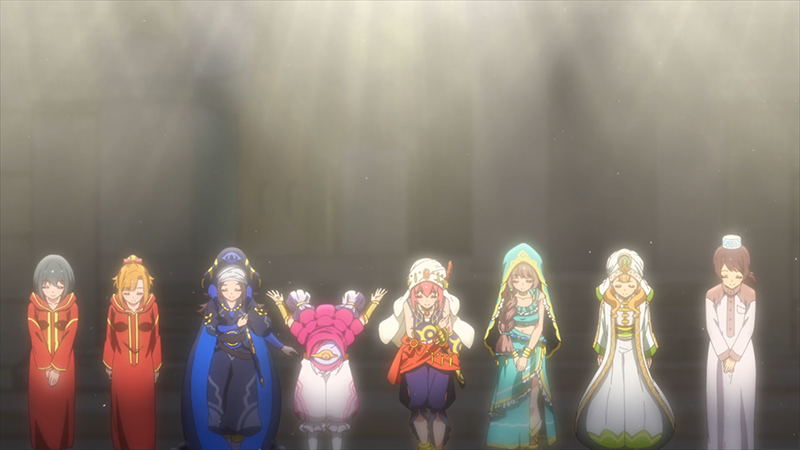
Summing up, World Dai Star is a great showcase of musical theatre, being able to deliver some captivating performances due both to its strong production and ability to weave the show’s drama into them. The supernatural element of World Dai Star is a pretty good hook, but is also possibly the worst part of it due to the concept of the senses being underexplained. There are a number of compelling character arcs in the show and the cast is great overall, but they do get uneven amounts of development leading to some standing out more than others.
I think with any show about a relatively niche topic, people will try and compare it to similar shows that have aired in the past. And as such, I’ve seen a lot of people compare World Dai Star to the two shows mentioned earlier, Kageki Shoujo!! and Shoujo☆Kageki Revue Starlight. So it only feels right to finish off this review with my own take on this. I believe that this show definitely does enough to stand on its own stage when compared to the others.
Revue Starlight goes way further in terms of fantasy than World Dai Star does, so while the drama is very similar in both, with the character’s wanting to be the top star as Revue Starlight calls it, they end up feeling very different. Tonally, Kageki Shoujo!! is a lot heavier than World Dai star is to where I would say both fall into different genres - Kageki Shoujo!! being a drama and World Dai Star having more in common with an idol or CGDCT show. And possibly most importantly, the performances feel very unique between each of the shows. Revue Starlight is so far gone from traditional plays, being more akin to glorified fight scenes, and the performances in Kageki Shoujo!! are not actual productions like they are in World Dai Star (bar I think one short scene). This leads World Dai Star’s performances to feel the most like actual plays out of the three.
Hopefully that comparison can make you see that World Dai Star does bring something unique compared to the other two shows, and in my opinion is a show worth a watch if you’re a fan of the other shows, or even something similar like an idol or GDCT show.
by Ross Locksley on 21 Dec 2025
by Ross Locksley on 25 Nov 2025
by Ross Locksley on 24 Nov 2025
by Ross Locksley on 11 Nov 2025
by Ross Locksley on 08 Nov 2025
by Ross Locksley on 07 Nov 2025
by Ross Locksley on 05 Nov 2025
by Jamie Morris on 27 Oct 2025